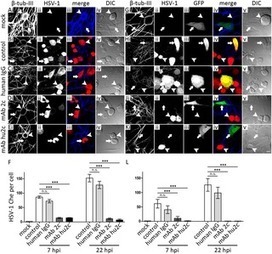AbstractCytomegalovirus (CMV) is a virus that causes chronic infections in a large set of the population. It may cause severe disease in immunocompromised individuals, is linked to immunosenescence and implied to play an important role in the pathogenesis of cardiovascular diseases and cancer. Modulation of the immune system's abilities to manage the virus represent a highly viable therapeutic option and passive immunotherapy with polyclonal antibody preparations is already in clinical use. Defined monoclonal antibodies offer many advantages over polyclonal antibodies purified from serum. Human CMV-specific monoclonal antibodies have consequently been thoroughly investigated with respect to their potential in the treatment of diseases caused by CMV. Recent advances in human antibody technology have substantially expanded the breadth of antibodies for such applications. This review summarizes the fundamental basis for treating CMV disease by use of antibodies, the basic technologies to be used to develop such antibodies, and relevant human antibody specificities available to target this virus.
Via Krishan Maggon



 Your new post is loading...
Your new post is loading...









doi:10.1016/j.molimm.2015.02.026
Highlights
•Cytomegalovirus (CMV) causes clinically important diseases.
•CMV carries multiple proteins involved in infection of different cell types.
•Antibodies may control CMV infection and be used for therapy.
•Antibody technology advances are important for CMV antibody development.
•Human monoclonal antibodies that prevent CMV infection are available.